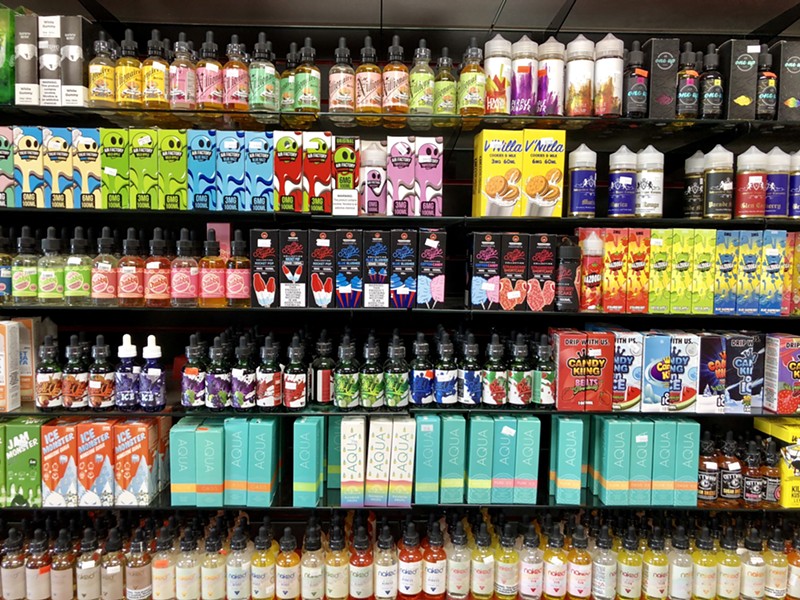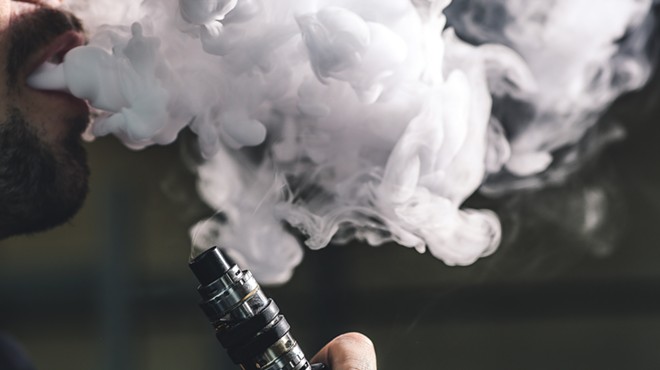
Adam Powell tried everything to quit smoking cigarettes — nicotine gum and patches, antidepressants, cold turkey, even hypnosis.
But each time he tried to break the habit, Powell ended up returning to the Newports he had smoked since he was 16. His longest period without a cigarette was three months.
"It was so frustrating," Powell tells Metro Times. "Unless you smoke, you have no idea how hard it is [to quit]."
Powell finally ended his 20-year relationship with Newports nearly two years ago after he saw a coworker vaping an e-cigarette. He decided to give it a go — and he hasn't looked back since.
"I don't care what anyone says. Cigarettes are a lot worse than vaping," says Powell, who estimates his nicotine intake is at least half of what it was with cigarettes. "I can breathe better, and I feel better."
Like many vapers, Powell was shocked when Gov. Gretchen Whitmer announced last week that Michigan would become the first state to ban flavored e-cigarettes and liquids. Under the ban, anyone possessing four or more "flavored vapor products or alternative nicotine products" faces a penalty of up to six months in jail.
"My number one priority is keeping our kids safe," Whitmer, a Democrat, declared on Twitter and Facebook on Sept. 4. "Right now, companies selling vaping products are using candy flavors to hook children on nicotine and misleading claims to promote the belief that these products are safe. That ends today."
The truth is, the ban is anything but certain. First, Whitmer has to file emergency rules declaring a public health emergency, which she said will happen in the next week or two. Once that happens, vape shop owners plan to file suit against Whitmer, arguing that she does not have the authority to unilaterally ban flavored e-liquid without legislative approval.
On Aug. 30, the Michigan Department of Health and Human Services made a "finding of emergency," saying the state "faces a vaping crisis among youth."
"From 2017 to 2018, e-cigarette use among youth increased 78% among high school students and 48% among middle school students," the health department wrote, calling the surge an "epidemic."
But that surge came before the state banned the sale of e-cigarettes to minors on Sept. 2.
"They haven't even given the law a chance to work," Jamie Lynne-Blair Webb, owner of DIY Vapor Supply in Waterford Township, tells Metro Times.
A former cigarette smoker herself, Webb says the ban will primarily impact former smokers who turned to vaping.
"I can legally go down the road and buy alcohol, and then go further down the road to buy marijuana, but they're going to tell me I can't vape? It's unreal," Webb says. "It's an egregious overreach."
Many Republican lawmakers agree. State Rep. Beau LaFave, who called Whitmer an "emperor," says he's "working on a bill to outlaw" the ban.
"The governor abused her power," LaFave tells Metro Times, saying the Public Health Code and Administrative Procedures Act were intended to respond to communicable diseases outbreaks. "This is not what the Legislature intended when drafting this."
State Rep. Matt Hall, R-Marshall, says the governor relied on an overly broad interpretation of her authority to make emergency rules and denied the public's right to provide input.
"The governor's decision to circumvent the democratic process by executive privilege evades any chance for legislative oversight, open hearings and public testimony on what she described as a growing health epidemic," Hall said in a statement.
Last year, New York Gov. Andrew Cuomo's administration tried to ban flavored vape liquid without legislative approval but backed down after industry insiders threatened legal action.
"It only took a few days for the state to recognize they lacked the legal authority to do so and pull the proposed rule," Gregory Conley, president of the American Vaping Association, said in a news release. "The same should happen in Michigan, but with Governor Whitmer personally delivering [the] message of prohibition, it looks like it will be up to the courts and state legislators to take corrective action."
Michigan Attorney General Dana Nessel, a Democrat, says she's prepared to defend Whitmer's ban.
"With a more than 1.5 million increase in the number of students using vaping products in just one year, the governor's emergency actions today are exactly the bold measures we must take to protect Michigan's children from the dangerous effects of vaping," Nessel said in a news release. "I commend the governor's decision and pledge my department's continued and shared commitment to keeping these products out of the hands of our kids."
Although health experts generally agree that vaping is less harmful than cigarettes, critics say flavored nicotine is appealing to children. Flavors include bubblegum, candy, and ice cream.
A recent outbreak of a mysterious lung illness linked to vaping also caused alarm. But new research suggests the potentially fatal illness was linked to an oil derived from vitamin E used in some marijuana products. Scientists are still investigating.
Stay on top of Detroit news and views. Sign up for our weekly issue newsletter delivered each Wednesday.


